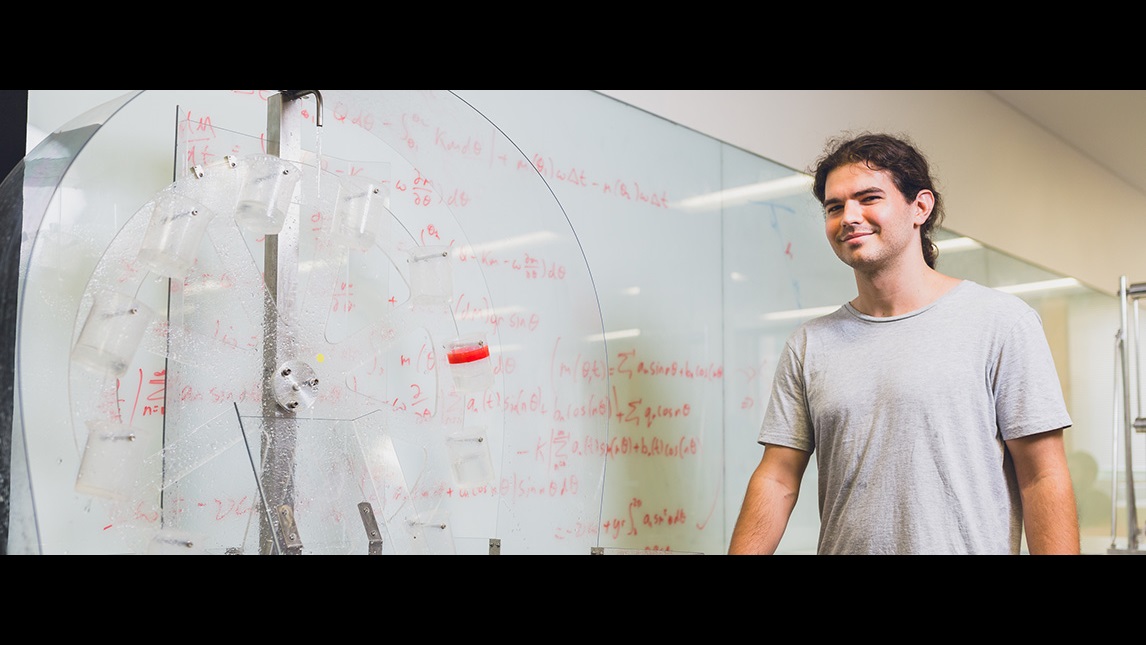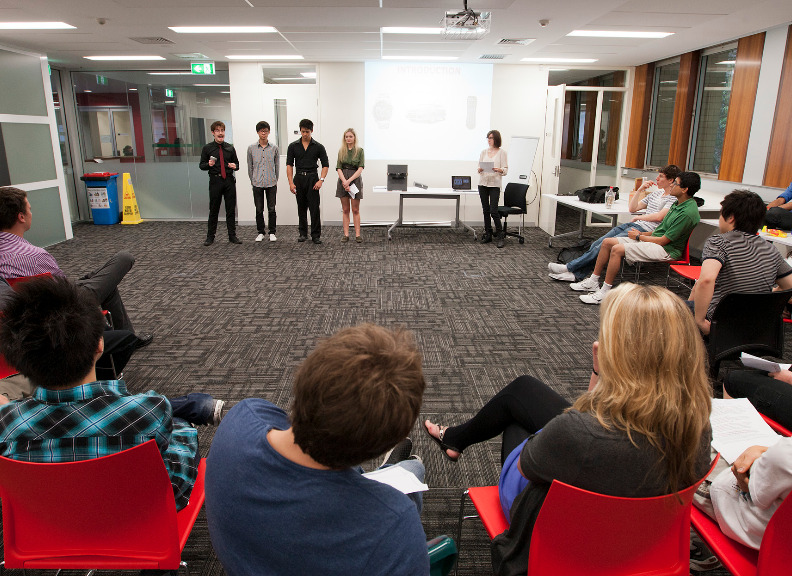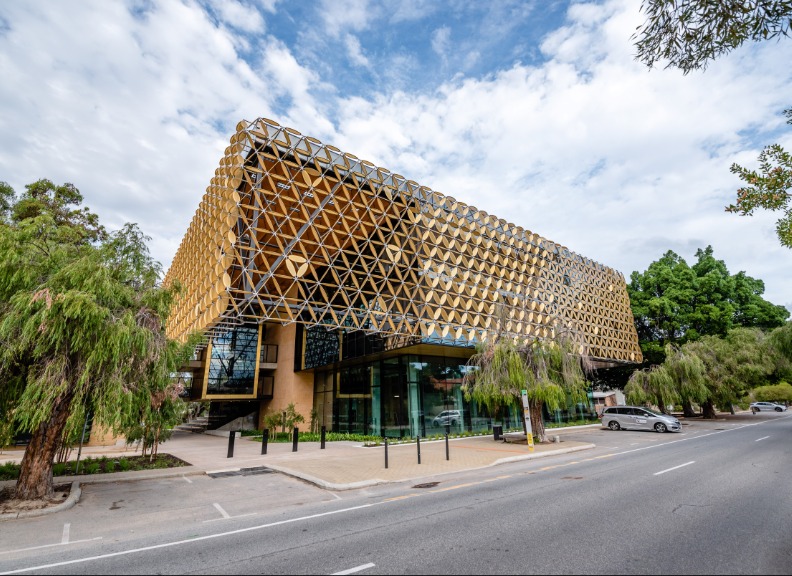Department of Mathematics and Statistics
Discover how prized achievements around the world rely on mathematics and statistics
Mathematics is humanity's most powerful tool for comprehending the universe and is essential for many fields of modern endeavours such as science, technology, engineering and finance.
The study of Mathematics and Statistics at UWA involves data analysis, forecasting, decision making and detailed problem-solving while determining creative ways to improve modern life with mathematical tools and techniques.
The Department conducts research in a wide variety of areas of mathematics and statistics such as complex systems, group theory, partial differential equations, discrete mathematics, geometry, mathematical modelling, data analysis and statistical methods.
The Department of Mathematics and Statistics was awarded 5 out of 5 in Excellence of Research Australia in Mathematical Sciences (Pure and Applied Mathematics).
Our courses
Selecting an Honours project and supervisor
The Honours program is an exciting opportunity to enhance your skills. We offer two honours programs in the Department of Mathematics and Statistics: Honours in Mathematics (for Applied Mathematics and Pure Mathematics) and Honours in Statistics (for Statistics and Data Science). You will do some advanced lecture units according to the area of specialisation and an honours dissertation, where you will do mathematical or statistical research. The program is usually done in one year.
The main requirements for honours entry at UWA are:
- completion of an undergraduate degree with a major in Mathematics or Statistics;
- a WAM of at least 70% in units forming your Mathematics or Statistics major in 3rd year; and
- have a supervisor from the Mathematics and Statistics Department.
(These are the main usual requirements. For the most updated detailed requirements, contact us.)
You can start in the first semester (beginning of the year) or in the second semester (mid-year), and it is possible to enrol part-time. The Honours programs are also part of the Bachelor of Mathematics and the Bachelor of Philosophy at UWA. Students who have completed their undergraduate degree at other universities are also welcome.
If you’re interested in the Honours program or have any questions, we’re here to help. Email us at [email protected].
Selecting an Honours project and supervisor
The Honours program is an exciting opportunity to enhance your skills. We offer two honours programs in the Department of Mathematics and Statistics: Honours in Mathematics (for Applied Mathematics and Pure Mathematics) and Honours in Statistics (for Statistics and Data Science). You will do some advanced lecture units according to the area of specialisation and an honours dissertation, where you will do mathematical or statistical research. The program is usually done in one year.
The main requirements for honours entry at UWA are:
- completion of an undergraduate degree with a major in Mathematics or Statistics;
- a WAM of at least 70% in units forming your Mathematics or Statistics major in 3rd year; and
- have a supervisor from the Mathematics and Statistics Department.
(These are the main usual requirements. For the most updated detailed requirements, contact us.)
You can start in the first semester (beginning of the year) or in the second semester (mid-year), and it is possible to enrol part-time. The Honours programs are also part of the Bachelor of Mathematics and the Bachelor of Philosophy at UWA. Students who have completed their undergraduate degree at other universities are also welcome.
If you’re interested in the Honours program or have any questions, we’re here to help. Email us at [email protected].
Our Research Areas
- Applied Mathematics
-
Applied Mathematics is about using the theory and techniques of mathematics and statistics to understand and deal with the real world.
Biological and physical sciences, computing, commerce, medicine, manufacturing industry and environmental management are some of the fields which need to connect with mathematics and its the job of the applied mathematician to make the connections.
Our researchers:
- David M. Walker - Complex networks, Nonlinear time series, Dynamical systems, Modelling animal behaviour, granular media and other physical, ecological and biological systems
- Miccal Matthews - Theoretical mechanics, Differential equations, Mathematical modelling
- Michael Small - Complex systems, Complex networks, Non-linear dynamics, Complex data modelling
- Nev Fowkes - Industrial modelling, Theoretical mechanics
- Shannon Algar - Swarming, swarm-reservoir computers, nonlinear time series
- Thomas Stemler - Complex systems and networks, Nonlinear time series analysis, Dynamical systems, Paleo-climate proxy analysis and traffic modelling
- Pure Mathematics
-
Pure Mathematics is about understanding the fundamental properties of mathematical concepts and objects whose original motivation may have come from problems in the real world.
Topics can be categorised roughly as “algebra”, “combinatorics”, and “analysis”. Algebra and combinatorics have a discrete feel to it (like constructing or breaking codes), whereas analysis has a continuous flavour (like studying properties of mechanical systems).
Our researchers:
- Alice Devillers - Graph theory, Incidence geometry, Combinational designs
- Caterina Sportelli - Partial differential equations, Non-local equations and non linear analysis
- Cheryl Praeger - Group theory, Graph theory, Combinatorial designs, Group algorithms
- Edoardo Lippi - Partial differential equations, Nonlinear analysis, Nonlocal equations
- Enrico Valdinoci - Partial differential equations, Free boundary problems, Calculus of variations, Nonlocal equations
- Giovanni Giacomin - Calculus of variations and partial differential equations
- Gordon Royle - Graph theory, Matroid theory, Combinational computation
- Jack Thompson - Partial differential equations, nonlocal equations, overdetermined problems, nonlocal mean curvature, and applications
- John Bamberg - Incidence geometry, Combinational computation\
- Luchezar Stoyanov - Dynamical systems and ergodic theory, geometry, scattering theory
- Luke Morgan - Group theory, Algebraic graph theory
- Lyle Noakes - Variational problems in differential geometry, and applications in approximation theory
- Mary Vaughan - Partial differential equations, Nonlocal operators, Free boundary problems, Nonlinear equations
- Michael Giudici - Group theory, Graph theory
- Serena Dipierro - Partial differential equations, Free boundary problems, Calculus of variations, Nonlocal equations
- Statistics
-
The study of mathematical statistics involves quantitative skills and knowledge of statistical methods, both their practical application and their mathematical foundations.
Applied statistics is concerned with the application of statistical methods. These applications can be in a huge variety of areas, such as medicine, business, finance, science and industry. Statistical inference is central to the field of infectious disease modelling - combining mathematics, statistics, and computation to track the course of epidemics and pandemics, and plan how best to counter them.
Research includes practical experience using computer systems to analyse data, and the ability to understand and criticise arguments based on numerical data or mathematical reasoning.
Our researchers:
Community and industry engagement
WA Junior Mathematics Olympiad
UWA works with the Western Australia Mathematical Olympiad Committee to host the annual WA Junior Mathematics Olympiad for exceptional Year 7, 8 and 9 students.
The competition seeks to find the youngest mathematical minds in the state. Prizes include an award for the most outstanding Year 9 and Year 8 student, as well as prizes for the best mathematic team. A number of Western Australian universities sponsor the prizes, along with the Department of Education, Mathematical Association of Western Australia, New Edition Bookshop, Data Analysis Australia, Optiver and Casio Education.
Blakers Mathematics Competition
The Blakers Mathematics Competition was established with a bequest from the family of Professor Larry Blakers after his death in 1995.
The first Competition was a local event, for UWA students only, in 1996. Since 1997, the Competition has been held annually, open to first to third year students at any Western Australian university.
Professor Blakers was a Professor of Mathematics at UWA for 30 years and Head of Department for 29 of them. He played an important role in the foundation of the Australian Mathematical Society, the Australian Association of Mathematical Teachers and the Mathematical Association of Western Australia (MAWA), and was a founder and long term Director of the National Mathematics Summer School for gifted high school students which takes place in Canberra each year.
See honour roll of previous winners, and problems and solutions of previous years, here.
The Centre for Applied Statistics
The Centre for Applied Statistics provides expert training and consultancy in statistics to enable the University, industry and government to produce excellent research.
Visit the Centre here.
Spotlight on our people
UWA is home to world-class researchers in mathematics and you'll have the opportunity to work alongside these researchers on cutting-edge projects. You'll gain valuable research experience, as well as the opportunity to develop strong relationships with academics who can serve as mentors and references in the future.
- Adriano Polpo
- Alice Devillers
- Berwin Turlach
- David Walker
- Des Hill
- Ed Cripps
- Enrico Valdinoci
- Gopal Nair
- Gordon Royle
- John Bamberg
- John Lau
- KD Dang
- Luchezar Stoyanov
- Lyle Noakes
- Miccal Matthews
- Michael Bertolacci
- Michael Giudici
- Michael Small
- Nazim Khan
- Nick Golding
- Serena Dipierro
- Shannon Algar
- Thomas Stemler




